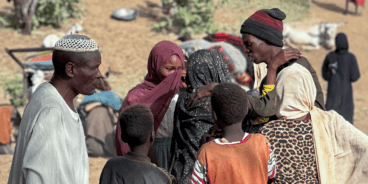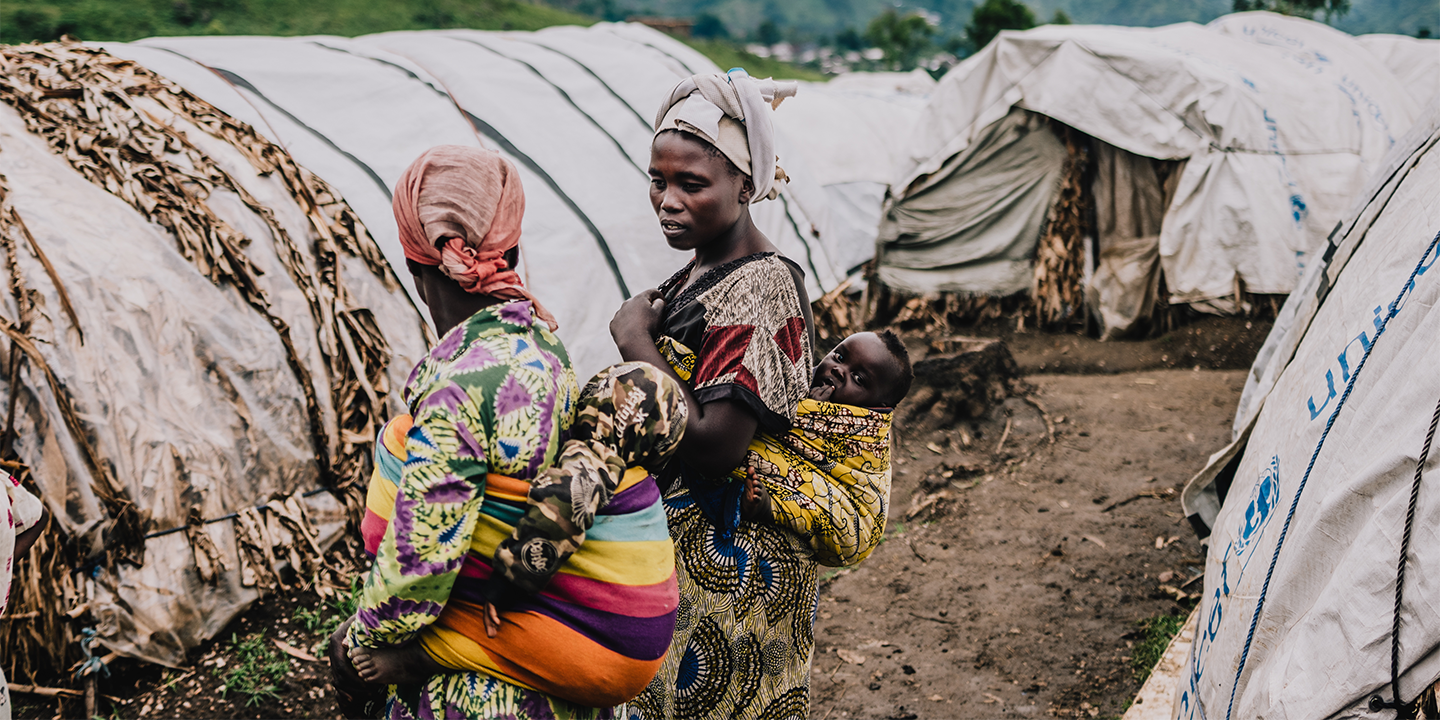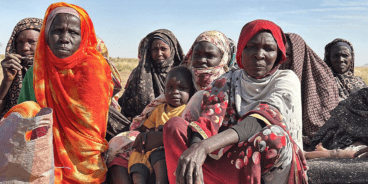

Atrocity Alert No. 400: Global Trends in Forced Displacement, Israel and the Occupied Palestinian Territory and Ethiopia
Atrocity Alert is a weekly publication by the Global Centre for the Responsibility to Protect highlighting situations where populations are at risk of, or are enduring, mass atrocity crimes.
GLOBAL TRENDS IN FORCED DISPLACEMENT AND MASS ATROCITIES
On 13 June the UN Refugee Agency released its annual “Global Trends” report in advance of World Refugee Day, warning that forced displacement has surged to historic new levels across the globe. One in every 69 people, or 1.5 percent of the entire world’s population, is now forcibly displaced. The continued rise in forced displacement – exceeding 120 million people as of May 2024 – was the 12th consecutive annual increase and reflects the expansion of new or ongoing conflicts where perpetrators are targeting civilians, the longevity of crises preventing displaced populations from returning home and the failure to resolve the world’s conflicts. Between 2021 and 2023 alone, the average number of people forced to flee persecution, conflict and human rights violations exceeded 27.8 million – nearly double the 25-year average.
The commission of atrocity crimes often results in mass civilian displacement. The total number of refugees around the world more than tripled compared to a decade ago, with 43.4 million refugees at the end of 2023. The largest proportion of refugees globally were from Afghanistan and Syria, followed by Venezuela, Ukraine and Sudan. Nearly three in four refugees originated from these countries, where state and/or non-state actors have perpetrated crimes against humanity or war crimes with near-complete impunity.
Meanwhile, at least 68.3 million people remained internally displaced due to conflict and violence in 2023, a 10 percent increase compared to the end of 2022. The outbreak of an armed confrontation between the Sudanese military and paramilitary forces in April 2023 has caused one of the largest humanitarian and displacement crises, with more than 6 million people internally displaced last year. Escalating violence throughout 2023 in Myanmar (Burma) displaced over 1.3 million people, while recurrent attacks in the eastern provinces of the Democratic Republic of the Congo forcibly displaced 2.8 million people last year alone. The UN Relief and Works Agency for Palestine Refugees in the Near East estimates that between October and December 2023 at least 1.7 million Palestinians – over 75 percent of the population – were displaced in the Gaza Strip, with most forced to flee multiple times.
Filippo Grandi, UN High Commissioner for Refugees, said, “Behind these stark and rising numbers lie countless human tragedies. That suffering must galvanize the international community to act urgently to tackle the root causes of forced displacement.” World Refugee Day should serve as a powerful reminder that humanitarian assistance and refugee resettlement are no substitute for investment in conflict prevention and policies that build a state’s capacity to prevent atrocity crimes and protracted conflicts before they occur. The international community must ensure that those facing displacement receive effective protection and assistance.
ISRAEL COMMITTING WAR CRIMES AND VIOLATING IHL, ACCORDING TO TWO UN REPORTS
Israel has committed war crimes and crimes against humanity during its military operations and attacks in Gaza since 7 October 2023, according to a report released on 12 June by the UN Independent International Commission of Inquiry (CoI) on the Occupied Palestinian Territory, including East Jerusalem, and Israel. The crimes include starvation as a method of warfare, intentionally directing attacks against civilians and civilian objects, sexual violence, torture and forcible transfer, among others. The CoI further details that statements made by Israeli officials, including those reflecting a policy of inflicting widespread destruction and killing large numbers of civilians, “amounted to incitement and may constitute other serious international crimes,” namely potential genocide. The CoI also found that during the attack on 7 October, members of the military wings of Hamas and other Palestinian armed groups committed war crimes and other violations and abuses of international law, including deliberately killing, injuring and mistreating civilians, taking hostages and committing sexual and gender-based violence.
On 19 June the Office of the UN High Commissioner for Human Rights (OHCHR) published an assessment of six emblematic attacks carried out by Israeli forces in Gaza from 9 October to 2 December 2023. These attacks involved the suspected use of 2,000 pound, 1,000 pound and 250 pound bombs on residential buildings, a school, refugee camps and a market. OHCHR concluded that these strikes, which led to significant civilian casualties, indicate Israel may have repeatedly violated fundamental principles of International Humanitarian Law (IHL), particularly in relation to respect for the principles of distinction, proportionality and precaution, and that Israel’s methods and means of conducting hostilities in Gaza have failed to effectively distinguish between civilians and combatants. OHCHR’s report also highlights continued firing of indiscriminate projectiles by Palestinian armed groups toward Israel, inconsistent with IHL obligations.
Since the release of both reports, Palestinians in Gaza continue to be killed by strikes and missiles. On 21 June at least 24 people were killed and 50 injured when a shelling attack struck close to the International Committee of the Red Cross office in Al Mawasi, where hundreds of displaced civilians are living in tents. According to witnesses, the shelling was likely conducted by Israeli forces. Israel also launched repeated strikes on Ash Shati’ Refugee Camp near Gaza City, killing at least 34 Palestinians from 21-22 June. These attacks occurred less than a month after Israel’s deadly military operation against An Nuseirat Refugee Camp, which killed at least 274 Palestinians and injured nearly 700 others. Following Israel’s strikes on Ash Shati’, OHCHR reiterated that “Israel’s conduct of hostilities continues to raise concerns over serious violations of international humanitarian law.”
An immediate ceasefire must be urgently reached and all attacks against the civilian population must be halted. UN Security Council Resolution 2735 should be implemented without delay. Israel must immediately implement all provisional measures orders issued by the International Court of Justice.
UN SPOTLIGHTS ONGOING KILLINGS AND HUMAN RIGHTS ABUSES IN ETHIOPIA
On 14 June the Office of the UN High Commissioner on Human Rights (OHCHR) released a detailed update on Ethiopia, examining the human rights situation in the country from January 2023-January 2024. OHCHR documented at least 1,351 civilians killed, including 740 from the Amhara ethnic group, in attacks reportedly perpetrated by federal and regional government forces, Eritrean forces and myriad militias. The report also concluded that between 4 August and 31 December unmanned aircraft killed at least 248 civilians and destroyed civilian infrastructure, including schools and hospitals, in the Amhara and Oromia regions. OHCHR recorded 594 incidents of human rights violations during the reporting period, impacting at least 8,253 victims. Government forces were responsible for a least 70 percent of these abuses.
Notably, the update highlighted the ongoing crisis in the Amhara region, where the authorities imposed a state of emergency in August 2023 due to fighting between federal government forces and ethnic Amhara fano militia. The most common violations during the state of emergency – which remained in effect until 3 June 2024 – included arbitrary arrests and detentions, followed by killings of civilians, torture, enforced disappearances and attacks on civilian property. OHCHR also analyzed the attack in Merawi, a town near the regional capital of Bahir Dar, where at least 89 civilians were killed reportedly by government troops on 29 January 2024. According to the update, fano militia and their allies also committed abuses, including the killing of at least 52 people, as well as the destruction of civilian property and attacks on medical personnel.
In Oromia, Ethiopia’s largest and most populous region, fighting continues between government forces and armed militias, including the Oromo Liberation Army. At least 366 people were killed in Oromia during the reporting period. In addition, inter-ethnic clashes between Amhara and Oromia militias, and Oromia and Somali groups, also resulted in civilian deaths. Meanwhile, in the Tigray region, OHCHR documented ongoing abuses despite the November 2022 cessation of hostilities, including sexual violence perpetrated by neighboring Eritrean forces who continue to occupy territory in Tigray.
Targeted killings of civilians, attacks on civilian infrastructure, arbitrary arrests, torture, enforced disappearances and sexual and gender-based violence are all prohibited under international law and may amount to war crimes and/or crimes against humanity.
In a press release about the update, the UN High Commissioner for Human Rights, Volker Türk, urged parties to the conflict to “halt ongoing hostilities and to resolve difference through peaceful means. It is essential that the authorities take all feasible steps to protect civilians, prevent further violations, and ensure there are full investigations to bring those responsible to justice.” The international community must not turn a blind eye to the ongoing abuses in Ethiopia and ensure accountability for both past and ongoing atrocity crimes.
Related Content


Joint Statement: Genocide Returns to Darfur
